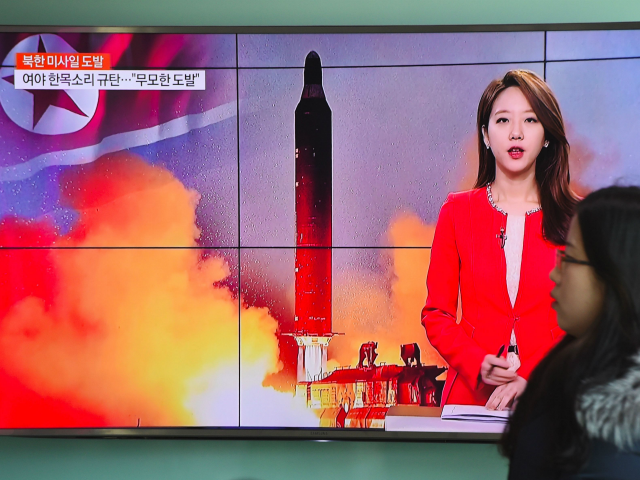North Korea’s state newspaper, the Rodong Sinmun, claimed Friday that Kim Jong-un had personally guided a new “strike drill” meant to hone long-range accuracy while complaining that U.S. military drills were a needless “provocation” threatening the stability of the region.
The communist regime also fired several more short-range projectiles late this week, an apparent response at American officials refusing to urge the international community to ease sanctions on the country for its illegal nuclear program. North Korean propaganda often accuses Washington of single-handedly being responsible for its woeful economic state through sanctions; while the United States has levied direct sanctions on Pyongyang, the strictest sanctions on the country came from the United Nations, where even Kim’s closest ally, China, voted for and implemented them following the country’s latest nuclear weapon test in September 2017.
The drill that Rodong Sinmun revealed allegedly occurred on Thursday “in the forefront area and on the western front” and “successfully showed the might of the units which were fully prepared to proficiently carry out any operation and combat in the flames of the practical actual maneuvers kindled by the Party.” As it typically does, the newspaper gave Kim personal credit for the success of the exercise.
Kim allegedly told soldiers at the drill that “the genuine peace and security of the country are guaranteed only by the strong physical force capable of defending its sovereignty,” implying that North Korea was facing new challenges to its sovereignty, presumably by the United States.
While boasting of the drill’s success, Rodong complained that other countries, namely the United States and South Korea, had conducted their own military exercises. The two countries reportedly tested the efficiency of the Pentagon’s Terminal High Altitude Area Defense (THAAD) system, installed in South Korea to shoot down North Korean missiles that Kim may fire at civilian centers in the country. While North Korea has naturally protested the THAAD system the loudest, China and Russia have also objected to its installation, as its capabilities can reach deep past their respective borders.
“The deployment drill is apparently an extension of the U.S. policy of sanctions to stifle the DPRK, a military provocation to chill the hard-won atmosphere of peace on the Korean peninsula created with much effort and an open threat and blackmail against the DPRK,” Rodong complained. “In the face of a flurry of censure from a broad spectrum of people against the drill, the U.S. is making lame excuses but it is just a thinly-veiled trick to spare denunciation as the harasser of peace by all the Koreans and the world peace-loving people.”
South Korea’s conservative newspaper Chosun Ilbo reported Friday that North Korea also fired two unidentified “projectiles” on Thursday into the Sea of Japan (which South Korea refers to as the East Sea). The missiles flew at about a 30-mile altitude, the newspaper said, citing the Joint Chiefs of Staff in the country. Chosun also predicted that the projectiles were likely Russian-made Iskander-class short-range missiles, though no confirmation is possible without recovering some of the pieces or seeing footage of the launch, which North Korea does not typically publish.
The newspaper suggested the new missile launches were an expression of “growing frustration that no easing of international sanctions is in sight while it continues to refuse to end its nuclear and missile programs.”
This weekend, North Korea’s state media confirmed another test of “multiple rocket launchers and tactical guided weapons,” once again insisting the tests are a necessary response to alleged American aggression. Rodong Sinmun proclaimed the country an “invincible power that has fulfilled the historic cause of parallel development” for the exercise.
“We now have a self-sustaining war deterrence with which we can resolutely subdue and smash any kind of tyranny and fanaticism,” the newspaper told its citizens, who have no access to news not produced by the Kim regime’s “Propaganda and Agitation Department.”
North Korea launched a flurry of military activity this month shortly following the first in-person meeting between Kim and Russian President Vladimir Putin in Vladivostok, a far eastern Russian city near North Korea. At that meeting, Kim reportedly complained to Putin that U.S. President Donald Trump had acted “in bad faith” against him during their last meeting in Vietnam, which occurred in February. Trump left that meeting, scheduled to last two days, after the first night, telling reporters that Kim and his negotiators were too intransigent in their demands for a deal to be possible.
ABC News revealed Thursday that among North Korea’s demands to end its illegal nuclear program was a request for Trump to send “famous basketball players” to entertain Kim in Pyongyang. The demand was reportedly so important the North Koreans wanted it in writing in a joint declaration following the meeting. Instead of granting it, Trump walked out.

COMMENTS
Please let us know if you're having issues with commenting.